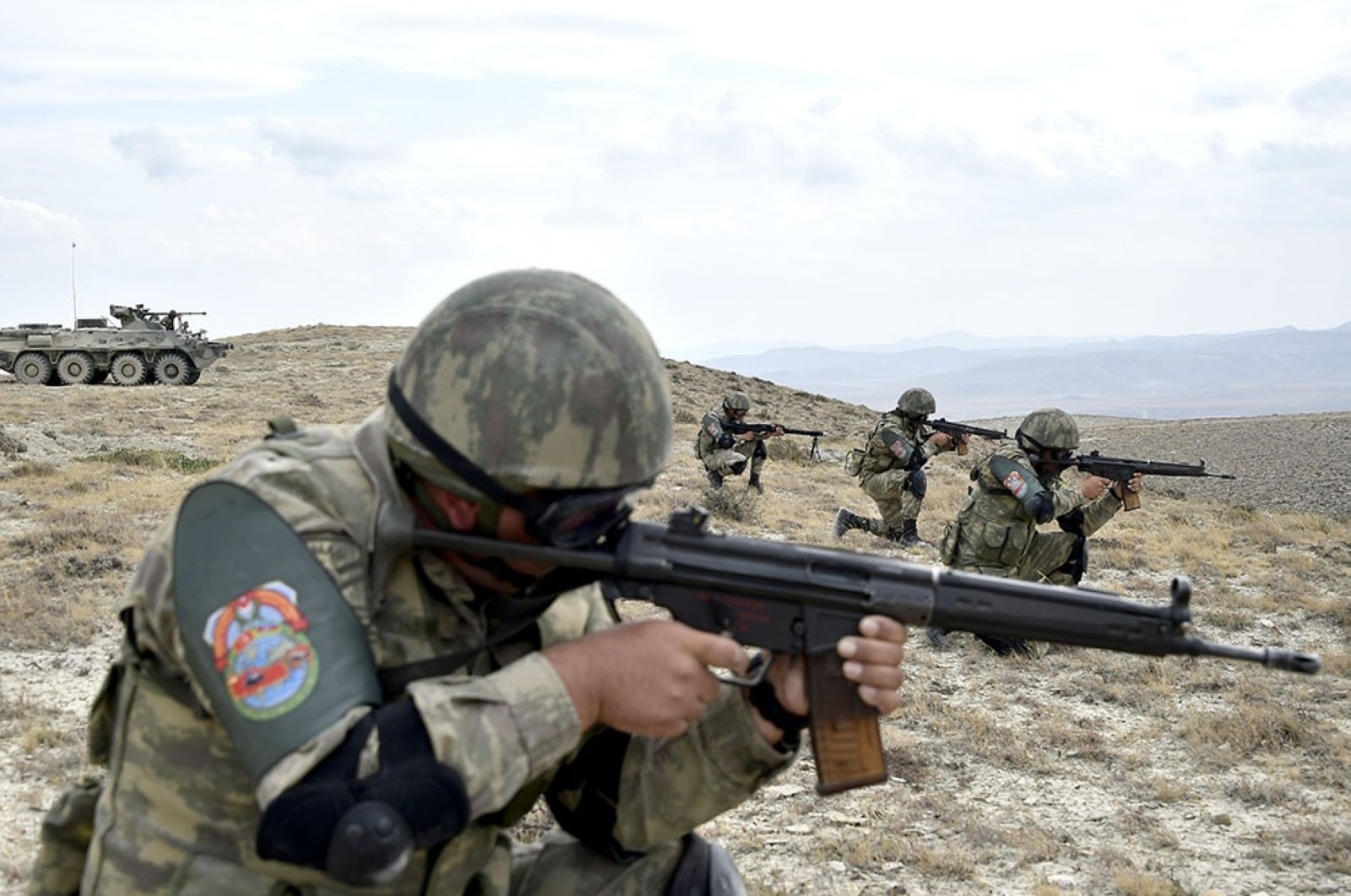An Azerbaijani serviceman was killed on Wednesday morning as a result of intensive fire launched by the illegal Armenian armed gangs deployed in the Azerbaijani territories temporarily monitored by the Russian peacekeepers.
According to a report by Azerbaijan’s Defense Ministry, Anar Kazimov, an 18-year-old conscript of the Azerbaijani army, died from a bullet wound during the incident in the Lachin district.
Azerbaijan’s Foreign Ministry called the fatal event a gross violation of the Azerbaijan-Armenia-Russia trilateral agreement.
“The Azerbaijani side has repeatedly stated that Armenia has not fulfilled the obligations assumed by it in accordance with the trilateral statement of November 10, 2020, and that the illegal Armenian armed detachments have not yet been withdrawn from the territory of Azerbaijan,” the ministry’s statement reads.
“The bloody incident that took place on August 3 once again demonstrates that Armenia grossly violated the trilateral agreement, and at the same time undermined efforts toward the normalization of relations between the two states. This is also an indicator of Armenia's disrespect for the efforts of international mediators.”
The ministry added that all responsibility for the incident lies with the political and military leadership of Armenia, “which has not yet withdrawn illegal armed detachments from the territories of the neighboring state.”
Meanwhile, the Prosecutor General’s Office of Azerbaijan launched a criminal case into the killing of the Azerbaijani soldier by Armenian armed criminals.
In July, the illegal Armenian armed formations repeatedly targeted the positions of the Azerbaijan Armed Forces. On July 26, similar incidents took place in the Khojavand and Khojaly districts of Azerbaijan. These districts are currently within the area temporarily monitored by the Russian peacekeeping contingent, whose mandate includes clearing the territory from illegal armed formations and preventing such incidents.
These provocations have caused a backlash from President Ilham Aliyev, who said the withdrawal of the Armenian troops from Azerbaijan’s Karabakh (Garabagh) region remained unresolved despite the legal obligations put on Armenia under the tripartite agreement. Article 4 of the document requires the withdrawal of the Armenian armed formations from Azerbaijan’s territories simultaneously with the deployment of the Russian peacekeeping mission. President Aliyev noted that Baku had repeatedly raised this issue with the Armenian side and the Russian military leadership, but Armenia was delaying the resolution of the issue. According to the Azerbaijani president, a high-ranking official of the Russian Defense Ministry promised that Armenian armed forces would withdraw from the Azerbaijani territories by June 2022, but Russia’s peacekeeping contingent has not been forcing Armenia to do it.
Wednesday’s fatal incident came amidst the ongoing efforts for defrosting the bilateral ties between Azerbaijan and Armenia.
In April 2022, the foreign ministers of the two countries held two consecutive phone talks to discuss the issues on the bilateral agenda. On July 16, the ministers held a face-to-face meeting in Georgia’s capital Tbilisi, the agenda of which included the delimitation and demarcation of the state border, mutual recognition of territorial integrities, and unblocking of transport links, as well as withdrawal of illegal Armenian armed groups from Azerbaijan’s territories.
Armenia and Azerbaijan had been locked in one of the world’s most protracted conflicts for nearly three decades. In 1991, Armenia launched a full-blown military campaign against Azerbaijan, which lasted until a ceasefire in 1994 and saw Armenia occupying 20 percent of Azerbaijan’s internationally recognized territories. Over 30,000 Azerbaijanis were killed, and one million were expelled from those lands in a brutal ethnic cleansing policy conducted by Armenia.
On September 27, 2020, the decades-old conflict between Armenia and Azerbaijan spiraled after Armenia’s forces deployed in the occupied Azerbaijani lands shelled military positions and civilian settlements of Azerbaijan. During the counter-attack operations that lasted 44 days, Azerbaijani forces liberated over 300 settlements, including the cities of Jabrayil, Fuzuli, Zangilan, Gubadli, and Shusha, from nearly 30-year-long illegal Armenian occupation. The war ended in a tripartite statement signed on November 10, 2020, by Armenia, Azerbaijan, and Russia. Under the statement, Armenia also returned the occupied Aghdam, Kalbajar, and Lachin districts to Azerbaijan.
However, the peace in the region remains fragile due to the provocations of the illegal Armenian armed groups. Since November 2020, Armenian armed groups resorted to numerous armed provocations against the Azerbaijani military posts. Just days after the ceasefire came into force, Armenian detachments hiding in the forests around the Khojavand district of Azerbaijan committed two deadly attacks, killing four Azerbaijani servicemen and a civilian.
In November 2021, a group of people led by an ethnic Armenian, Norayr Mirzoyan, threw an RGD-5 anti-personnel fragmentation grenade at the servicemen of the Azerbaijan Armed Forces and Russian peacekeepers stationed in the area near the Dashalti village of Shusha city. As a result of the incident motivated by “ethnic hatred,” three Azerbaijani servicemen received various degrees of injuries. Mirzoyan was captured by the Russian peacekeepers on the spot and was reportedly released without being sued.







 Armenian sappers commenced on Monday mine-clearance operations in the territories adjacent to the Saint Mary Church in village of Voskepar (Armenia...
Armenian sappers commenced on Monday mine-clearance operations in the territories adjacent to the Saint Mary Church in village of Voskepar (Armenia...
 Russian Foreign Minister Sergei Lavrov has reasserted that Moscow has no intentions to stop the fighting in Ukraine, even if peace talks commence.
Russian Foreign Minister Sergei Lavrov has reasserted that Moscow has no intentions to stop the fighting in Ukraine, even if peace talks commence.
 Iran has refuted reports of alleged damage to Shimon Peres Negev Nuclear Research Centre located southeast of Dimona, Israel, during the recent air...
Iran has refuted reports of alleged damage to Shimon Peres Negev Nuclear Research Centre located southeast of Dimona, Israel, during the recent air...
 Iran’s Foreign Minister, Hossein Amir-Abdollahian, has labeled a foiled Israeli drone attack in certain parts of the country as a "failure" for Isr...
Iran’s Foreign Minister, Hossein Amir-Abdollahian, has labeled a foiled Israeli drone attack in certain parts of the country as a "failure" for Isr...



